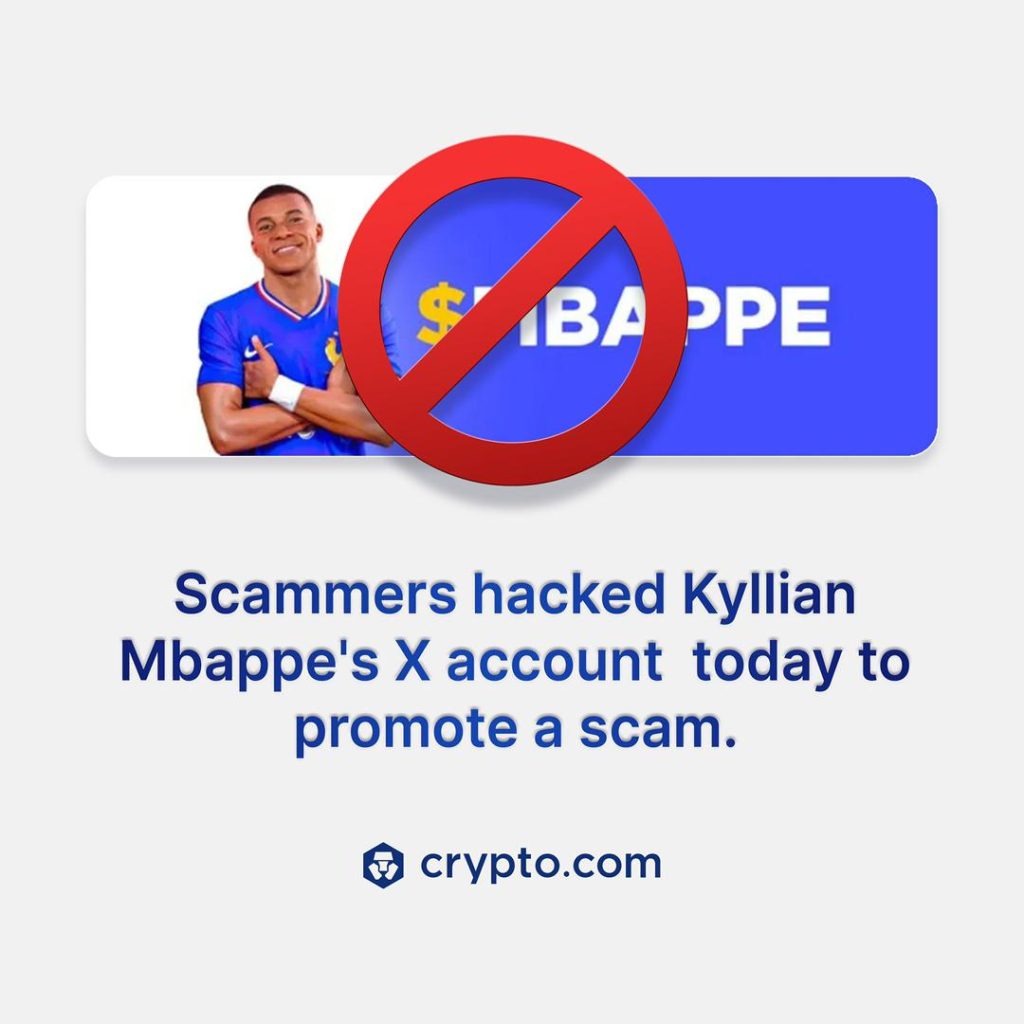Kylian Mbappé Warns Crypto Enthusiasts of Scam Token Promotion
Although the world of cryptocurrency is rampant with innovation and great potential, it has also
become a playing field for any number of scammers who seek to quickly scam would-be investors.
One of the most recent scandals surrounds Kylian Mbappé, the famous French footballer whose
name and image were used recently to promote a fake cryptocurrency token. The incident has
raised red flags across the crypto community and has brought into sharp focus the need for
increased vigilance among traders.
Emergence of the Fake Mbappé Token
On the night of August 28th, 2024, reports began to seep in of a new cryptocurrency token bearing
the name of Kylian Mbappé, aka the “Mbappé token” or “$MBAPPE.” It was being billed as a new
way of exciting investment, claiming to be supported by Mbappé himself. Of course, it soon
emerged that the football star had absolutely nothing to do with the token, and any promotion of
such was no more than a deceptively designed scam.
The scam token had been heavily overhyped on social media, particularly on X, previously known
as Twitter, on which a post from Mbappé’s account was said to have promoted the token. That
post would have come right under the noses of millions of followers of Mbappé, probably knowing
nothing about the fraudulent promotion of the token. It was soon found that the post was because
of a hack, and Mbappé’s team got it deleted in no time.

Crypto.com and Other Companies Issue Warnings Against The Scam.
With the Mbappé token in effect gaining momentum, some of the most important cryptocurrency
companies in the world began warning users. Included are Crypto.com, the 13th largest CEX
exchange globally. On August 29, Crypto.com took to X to tell its users not to invest in the
Mbappé token, citing it was a scam and for traders to avoid it.
The warning from the exchange saved many from becoming victims, but not everyone heeded it at
an opportune time. Sometimes, in the fast arena of cryptocurrency trading, quick profits make the
traders blind to the realization of the upcoming risk; no exception here either.
The Impact on Traders: Losses and Gains
Yet, despite the explicit warnings, the Mbappé token attracted a large number of traders. Many
were driven by FOMO—a fear of missing out—a kind of feeling that has become frequent in the
cryptocurrency market when investors race to buy into a token due to apprehension about possibly
missing profits. Unfortunately, for most, that very fear led to big financial losses.
While the vast majority came out as losers for having traded Mbappé tokens, some shrewd traders,
in a surprising ironic twist, actually garnered a decent chunk of change from the scam. One
trader, who reportedly turned $28 into nearly $124,000, was watched and shared by
pseudonymous trader “Yet” via an August 29 X post. According to Yet, at a market capitalization
of $80,000, the trader had spotted the Mbappé token and jumped into buy mode.
This trader cashed out at the peak, using his experience and a great sense of timing. According to
Coinstats data, he managed to cash out $126,000 worth of Solana (SOL) tokens in the run-up to the
collapse in price of the Mbappé token. While such a success story may seem impressive, this is but
a story that needs to be put into context—it’s an exception rather than a rule.
Lessons Learned and Vigilance after the Fact
The Mbappé token scam serves as a strict reminder of the dangers one always faces when dealing
with cryptocurrency. Though the potential for high returns might be attractive, the trader should be
sure to keep his wits about him when doing substantial research into an investment with any
particular token—especially those that sound a little too good to be true.
One of the key takeaways from this scam is verifying the authenticity of any crypto project before
putting your money into such projects. The use of well-known public figures, like Kylian Mbappé, in
touting scams is a tactical ploy meant to give credence to such fraudulent deals. At all times, such
endorsements should be crosschecked for authenticity on official channels.
What’s more, this incident sends the message that security becomes key within the ecosystem of
cryptocurrencies. Mbappé’s hacked social media account made it possible for scammers to reach a
wide audience and underlined how even high-profile targets can be exposed to a cyberattack. As
the crypto space keeps expanding, security measures will not only be restricted to investors but
also to platforms to avoid such incidents in the future.
The Facilitating Role of Social Media in Crypto Scams
Social media is a double-edged sword in the cryptocurrency world. Besides being a good way for
people in the crypto space to communicate and educate, it’s also a playing field for scammers. The
Mbappé token scam shows how quickly social media can be used to disseminate misinformation
and manipulate the public.
In such cases, the posting of a fake Mbappé endorsement via his compromised X account gives
credibility to the scam. Millions of followers can see it, even if it is just briefly up, and several
people may get enticed into investing in it because of a ‘rush’ feeling. This is what the scammers
depend on—the spread of information so fast that any initial wave is usually profit.
This incident highlights the need for critical thinking and skepticism when confronting
opportunities for investment in social media. Users must always question the authenticity of
endorsements and verify such endorsements from multiple sources before making any financial
commitments. Also, social media platforms have to be very proactive in detecting and removing
fraudulent content to safeguard their users against such fraud.
The Importance of Regulatory Oversight in the Crypto Space
Of course, this raises a lot of questions about the need for regulation within the cryptocurrency
market. It is, in fact, the decentralized nature of crypto that is among its core strengths. However,
this does have an Achilles’ heel: vulnerability to fraudulent schemes. Without a governing body that
could protect investors with rules and guidelines, scandals like the one involving the Mbappé token
propagate rapidly, with very little possibility of protection against them.
We have heard over the last couple of years the increased chatter that regulators and industry
leaders alike must enact more guidelines and enforcement. The belief is that this regulation would
prevent scams from happening because it punishes bad actors and increases the standard a
project would have to meet before being marketed to investors. Others are afraid that too much
regulation may stifle innovation in the budding cryptocurrency market.
One of the thorny challenges is the balance between regulation and freedom; however, some
oversight is needed to protect investors from fraud. This Mbappé token incident makes many
realize that even though still being in its infant years, the crypto industry needs to grow up
together with the risks involved if it is ever to attain legitimacy and long-term.
Cheap Remote Crypto Mining for you – Click Here
Conclusion: The Future of Crypto and Investor Responsibility
The Mbappé token scam is the sobriety of risks that may face the cryptocurrency market. If the
story of a trader who turned $28 into $124,000 headlined the news, it is an uncountable number
of traders who lost money to the scam provided a much more realistic reflection of the risks
involved.
With increased mainstream acceptance of more and more cryptocurrencies, so will the avenues to
scam or fraud be opened. Thus, investors should be responsible for financial decisions taken by
being well-informed, cautious, and validating the projects they invest in.
The Mbappé token saga Is a cautionary tale for new and experienced traders alike. So, in a market
built upon hype and speculation, it’s so easy to get taken in by various scams promising to bring in
quick riches. Events like this should help the crypto community take a step towards a better, more
secure, and more transparent environment for all participants.


